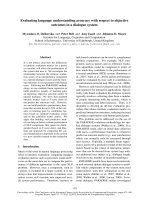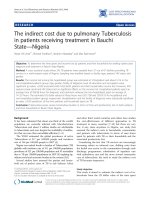Dystocia due to fetal goiter in a goat
Bạn đang xem bản rút gọn của tài liệu. Xem và tải ngay bản đầy đủ của tài liệu tại đây (278.11 KB, 3 trang )
Int.J.Curr.Microbiol.App.Sci (2019) 8(1): 641-643
International Journal of Current Microbiology and Applied Sciences
ISSN: 2319-7706 Volume 8 Number 01 (2019)
Journal homepage:
Original Research Article
/>
Dystocia due to Fetal Goiter in a Goat
Navdeep Singh1*, G.P.S. Sethi2, S.P.S. Ghuman3 and Kuldip Gupta4
1
Directorate of Livestock Farm, 2Department of Veterinary Gynaecology and Obstetrics,
3
Department of Teaching Veterinary Clinical Complex, 4Department of Veterinary Pathology,
Guru Angad Dev Veterinary and Animal Sciences University, Ludhiana - 141 004
*Corresponding author
ABSTRACT
Keywords
Congenital goiter,
Goat, Dystocia,
Thyroid gland,
Iodine deficiency
Article Info
This communication reports a case of dystocia due to congenital goiter in a
goat. The defective fetus was delivered successfully by changing its
presentation inside the uterus. The congenital goiter was confirmed by
histopathology of enlarged glands.
Accepted:
07 December 2018
Available Online:
10 January 2019
Introduction
Goiter is a common anomaly in goats
characterized by non-inflammatory and nonneoplastic enlargement of thyroid gland (Ani
et al., 1998). Low iodine intake or failure to
get dietary iodine is the common cause of
congenital goiter in kids (Bires et al., 1996).
The present report describes an unusual case
of congenital fetal goiter in two kids leading to
dystocia.
veterinary hospital with the history of severe
straining and recumbency for the last 7-8h.
Vaginal examination revealed a fully dilated
cervix with moist birth canal. The fetus,
without any reflex, was in anterior
longitudinal presentation with severe lateral
deviation of head. The hooves of both the
anterior limbs were extended into the birth
passage. An unsuccessful traction was tried at
field level to deliver the fetus.
Case history and observations
Treatment
A five-year-old full term pregnant doe in her
third parity was brought to university
The birth passage was well lubricated using
1% sodium carboxymethyl cellulose gel. After
641
Int.J.Curr.Microbiol.App.Sci (2019) 8(1): 641-643
assessing the fetus, the correction of deviation
was tried but failed. Thereafter, the forelimbs
were repelled into uterus and traction was
applied by grabbing hind limbs to deliver dead
fetus in posterior presentation.
Second fetus with similar presentation,
position and posture was delivered by
following the same procedure, however, the
live fetus died after few minutes of delivery.
The goat was discharged with the routine
prescription of antibiotics and supportive
therapy.
Gross examination and histopathology
On gross examination, the skin of both kids
was without hair, pale and thick with
myxedema (Fig. 1). Such type of the condition
is described as congenital goiter (Cheema et
al., 2010).
Fig.1 Congenital goiter in goat kids
Fig.2 Histological picture of goat thyroid showing colloid goitre with flattened epithelium
642
Int.J.Curr.Microbiol.App.Sci (2019) 8(1): 641-643
One kid having enlarged abdomen was
suggestive of ascites. The tongue of both kids
was swollen and protruded from mouth alongwith an enlargement in the upper neck region.
Removal of skin from the neck region revealed
two massive lobes of enlarged thyroid glands.
These were firm, solid and dark brown to red in
color. Congenital goiter with alopecia and
myxedema was diagnosed on the basis of gross
appearance.
uterus for changing its presentation from
anterior to posterior was helpful in delivery of
kid. In summary, a rare case of dystocia due to
congenital goiter in a goat kid is reported.
References
Ani, A.F.K., Khamas, W.A., Qudah, K.M.A.
and Rawashdah, O.A. 1998. Occurrence
of congenital anomalies in Shami breed of
goats; 221 cases investigated in 19 herds.
Small Ruminant Research,28, 225-232.
Bires, J., Bartko, P., Weissona, T., Michna, A.
and Matisak, T. (1996). Iodine deficiency
in Goats as a cause of congenital goitre in
kids. Veterinary Medicine,41(5), 133-138.
Cheema, A.H., Shakoor, A. and Shahzad, A.H.
2010. Congenital goitre in goats. Pakistan
Veterinary Journal, 30(1), 58-60.
Jain, R. 1990. Dietary intake of iodine in
selected goitre endemic and non- endemic
areas of Punjab. Ph.D. Dissertation,
Punjab Agricultural University, Ludhiana,
India.
McDonald, L.E. and Pineda, M.H. 1989.
Veterinary
Endocrinology
and
Reproduction. 4th Edition, Lea and
Febiger, Philadelphia, USA.
Paulikova, I., Kovac, G., Bires, J., Paulik, S.,
Seidel, H. and Nagy, O. 2002. Iodine
toxicity in ruminants. Veterinarni
Medicina, 47(12), 343-350.
Randhawa, C.S. and Randhawa, S.S. 2001.
Epidemiology
and
diagnosis
of
subclinical iodine deficiency in crossbred
cattle of Punjab. Australia Veterinary
Journal, 79, 349-351.
Singh, R., Randhawa, S.S. and Randhawa, C.S.
2006. Iodine status of crossbred cattle
from sub- mountainous areas of Punjab.
Indian Veterinary Journal, 283, 181-184.
Tissues from two lobes were processed by
routine histological procedure. Tissue sections
were cut at 4 μm thickness and stained by
routine haematoxyline and eosin method.
Thyroid tissue consisted of varying sized
thyroid follicles full of colloidal material with
hyperplasia of lining epithelium in places but
lined by a single layer of cuboidal epithelium
(Fig. 2). A marked variation was noted in the
contents of follicles and appearance of the
lining epithelium in different parts of the gland.
The main reason for the development of thyroid
hyperplasia is iodine deficient diets (Paulikova
et al., 2002). However, other reasons may be
feeding of goitrogenic compounds and/or plants
and genetic enzyme defects in biosynthesis of
thyroid hormones (McDonald and Pineda,
1989). According to a study, iodine intake was
low in buffaloes and cattle of Ludhiana,
Jalandhar, Ferozepur and Hoshiarpur districts of
Punjab (Randhawa and Randhawa, 2001; Singh
et al., 2006). Moreover, in Ludhiana district of
Punjab, low soil iodine content and occurrence
of endemic goiter (assessed by thyroid
palpation) in school children were observed
(Jain, 1990).
In the present case, enlarged thyroid glands
deviated the head of the fetus leading to
dystocia. However, the rotation of fetus inside
How to cite this article:
Navdeep Singh, G.P.S. Sethi, S.P.S. Ghuman and Kuldip Gupta. 2019. Dystocia due to Fetal Goiter
in a Goat. Int.J.Curr.Microbiol.App.Sci. 8(01): 641-643.
doi: />
643









